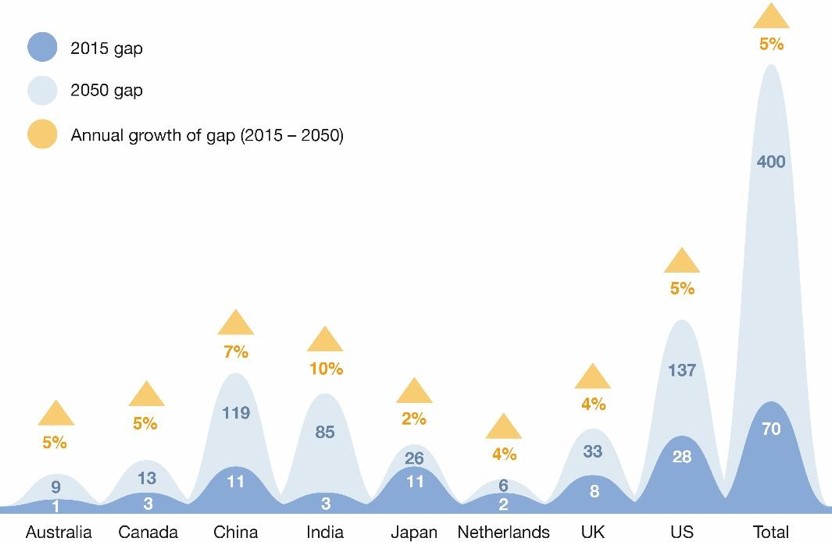It may surprise everyone to know that when it comes to corporate pension plans, the U.S. and Europe have some of the worst-funded schemes in the world, and ageing populations are adding to the pain and threatening the longevity of corporate retirement plans.
For Europe, the pain is about to get markedly worse because the Baby Boomers are ready to retire. And they’re already under fire by younger generations who accuse them of sucking up too much of society’s resources from pensions to healthcare.
Europe already has the largest population of pensioners in the world, and it is still growing.
According to the EU data agency, 42 out of every 100 workers in Europe are aged 65 or older and not working. By 2060, this will increase to a whopping 65 per 100 people. By comparison, in the U.S. there 24 non-working people 65 or over per 100 workers, according to the WSJ, citing the Bureau of Labor Statistics.
“By 2080 there will be less than two persons of working-age for each elderly person,” the agency noted.
When we add a low birthrate to these numbers, Europe is currently facing with demographic storm that’s going to be challenging—at best—to pay for.
The birth rate has fallen 40 percent since the 1960s to around 1.5 children per woman, according to the United Nations and in that time average life expectancies have risen from around 69 to roughly 80 years. That’s a correlation of data for which Europe is woefully unprepared.
According to Eurostat, the number of elderly people in the EU exceeded the number of children for the first time in 2005. By 2016, there were 97.7 million people in the EU aged 65 or older, compared with 79.5 million children. Related: Slow Wage Growth, Higher Unemployment In June Jobs Report
Europe’s getting older—fast.

(Click to enlarge)
Analysis by the World Economic Forum, the world’s six largest pension saving systems--the US, UK, Japan, Netherlands, Canada and Australia, as well as China and India--the two most populous countries in the world--faced a retirement savings gap of more than $400 trillion in 2050, up from $67 trillion in 2015.

(Click to enlarge)
Global pensions crisis will create a $400tn shortfall - Source: World Economic Forum
In the UK, the shortfall of $4 trillion retirement savings in 2015 is expected to rise 4% a year and reach $33 trillion by 2050, according to the WEF study. With GDP around $2.6 trillion, this is a massive shortfall, and those numbers are pre-Brexit. They could get worse.
A 2015 OECD study said that workers in developed countries could, on average, expect governmental programs to replace 63 percent of their working-age income. But in the UK, that figure drops to 38 percent, so there will have to be some serious tightening for pensioners.
Switzerland isn’t immune, either. It’s also ageing. Swiss voters rejected a pension reform plan last summer that would have raised the retirement age for women to 65 in an attempt to staunch the flow of Baby Boomer pension-seekers.
Then we have Germany, whose brilliant economic performance could end up being overshadowed by its own ageing population that won’t be able to keep pace with the current level of productivity.
Europe might be the worst-case scenario, but trouble is brewing the world over, in many cases because some pensions are unrealistic.
Related: Americans Leaving Their Jobs At Fastest Rate In 17 Years
Countries like Croatia, Turkey and the Netherlands have made retirement a windfall where you earn more when you stop working. According to the WEF, Dutch pensioners get 101 percent, while they get 102 percent in Turkey and 129 percent in Croatia.

(Click to enlarge)
Percentage of a working wage retirees receive around the world - Source OECD
Back in the U.S., the pension fund needs at least $4 trillion to pay out benefits it’s promised to government workers, and it’s only got $2.6 trillion. Pension liabilities in all 50 states increased by $295 billion to $4 trillion as of the end of 2016--and 2017 is expected to show some improvement, but heightened risk.
By Damir Kaletovic for Safehaven.com
More Top Reads From Safehaven.com:
















